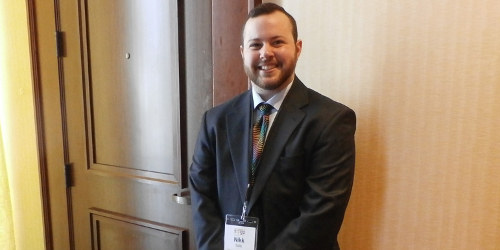
Nikk Selik took care to stress that every persons journey is unique and that most journeys are always ongoing. An idealized appearance is not necessarily an endpoint. He also said that gender is not binary. BTL photo: Crystal Proxmire
"When I realized I was trans, it came about unexpectedly. It was an epiphany. And once I knew that, I could never go back," said 25-year-old Nikk Selik as he shared his story with counselors, teachers and students at the annual SOGI Conference on Feb. 7. Selik is an FTM who has created a website and presentation called "Transcending Anatomy" to help people understand what it is like to be transgender.
Every transition story is different, and one thing that is unique about Selik's is that he's had tremendous support from his family and friends, and access to surgery and hormones that is not always the case for those transitioning. But the good fortune in his life has put him in a position to be able to share his story and teach others about transgender issues.
Selik was 20 when he made the decision to transition. "There's this idea that people have a 'sex change,'" he said. "Sex change is a very inaccurate term. Transitioning is a process." He explained that not everyone has access to the tools they need to change parts of themselves or their lives, and that some people may not want to make certain changes. But among some potential changes for transgender people there are social and physical ones.
"Social transition can include changing your name, changing the pronoun you prefer, dressing and presenting yourself differently," he said. Making physical changes can also help with transitioning, but it is not essential to being a transgender person.
He and other transgender people are often faced with "the question," Selik said. "Why is surgery the most common question? What a lot of people don't realize is this question is really inappropriate. Most transgender people do not have surgery. They're cutting you open, they're stitching you up. It's not fun. There are so many risks and complications… When I started I thought I would go all the way. But I'm not so sure I want genital surgery… What's in my pants does not make me a man."
Selik's experience with "top surgery" could be part of the reluctance. It took three attempts to get his chest surgery right. Prior to having tissue from his breasts removed, Selik wore a chest binder every day. "I was super desperate to get top surgery," he said. "Dysphoria was the reason I decided to transition. Dysphoria is a deep and unsettling discomfort. I felt, deep down, being in a female's body was not right." By having a flat chest, Selik is able to feel like himself in the world.
The other part of transitioning uses Hormone Replacement Therapy (HRT). Selik injects himself every two weeks with testosterone, which stops menstruation, deepens his voice, starts the growth of facial and body hair, and, unfortunately, produces acne. He explained that his MTF counterparts may take estrogen to give them softer skin and hair and helps them grow breasts.
Selik's parents struggled at first with the changes he was making, but a counselor convinced them to help him get his top surgery. "After a year and a half on hormones they saw how happy I was, and they're so supportive now," he said.
To help others understand what it means to be a transgender person, Selik set up a website at http://www.transcendinganatomy.com, and he gives presentations to schools, community group, conferences, and corporations.
Selik took care to stress that every person's journey is unique and that most journeys are always ongoing. An idealized appearance is not necessarily an endpoint. He also said that gender is not binary. He chose to transition from female to male because that is what fit for him, but that overall "it's not about changing genders, it's about getting rid of those labels… When a baby is born, the first thing we ask is 'is it a boy, or is it a girl?' 'Do we paint the room pink or do we paint it blue?'…The problem is not the people who have identities outside of these boxes. The problem is the existence of the boxes."










